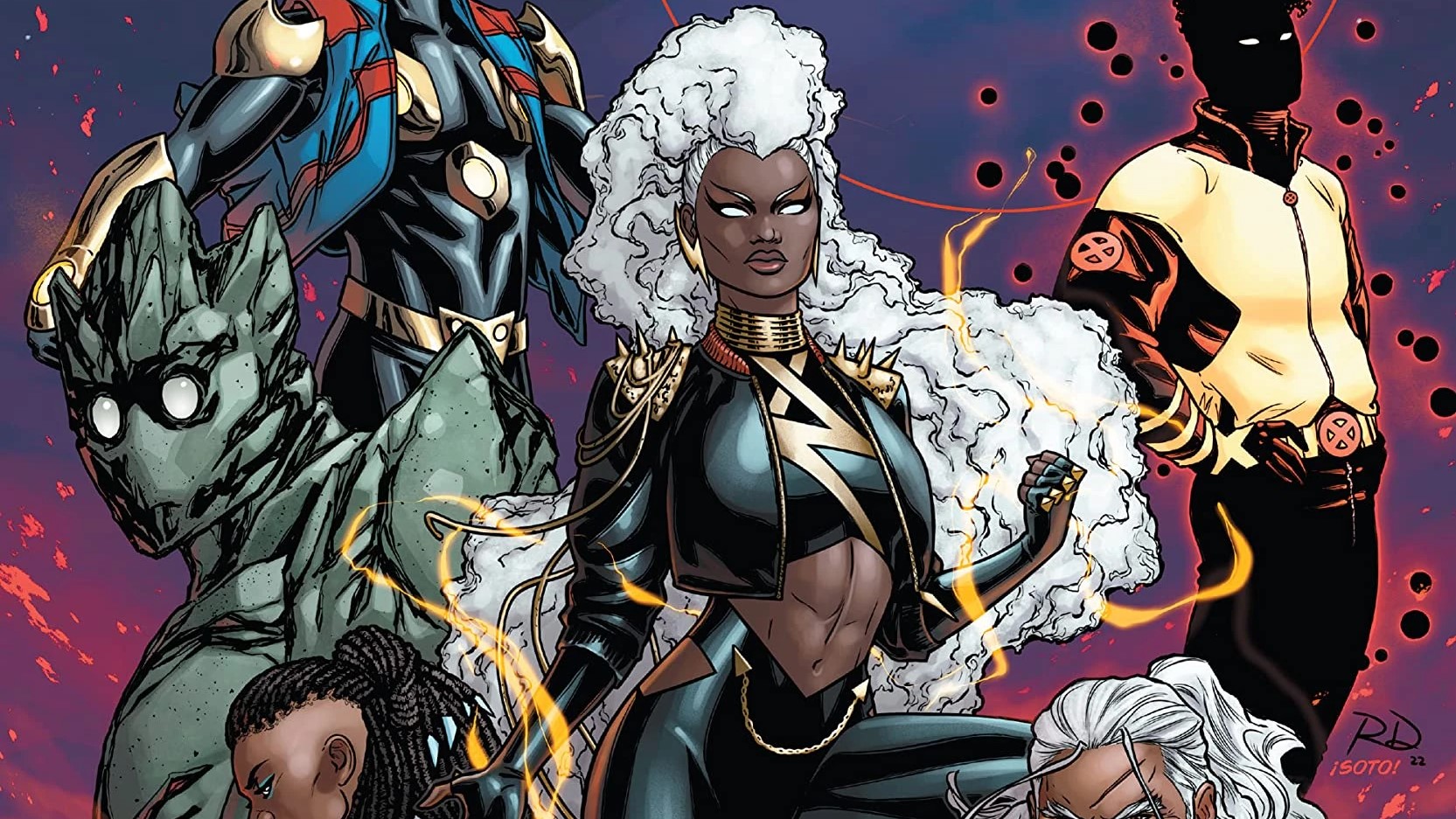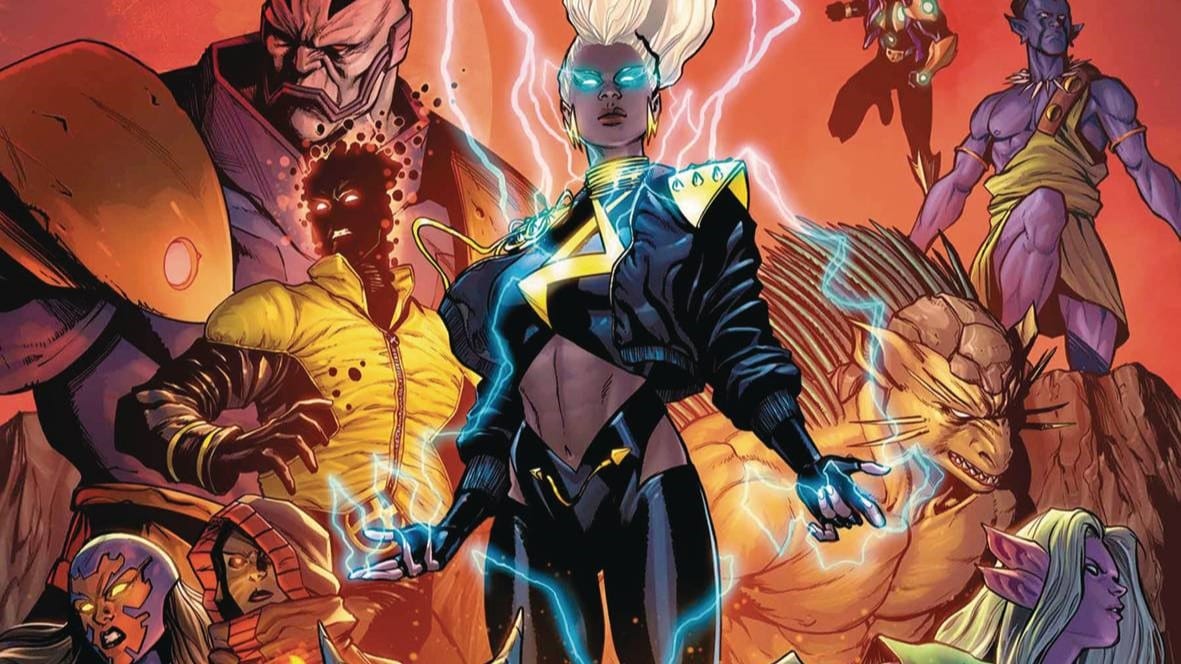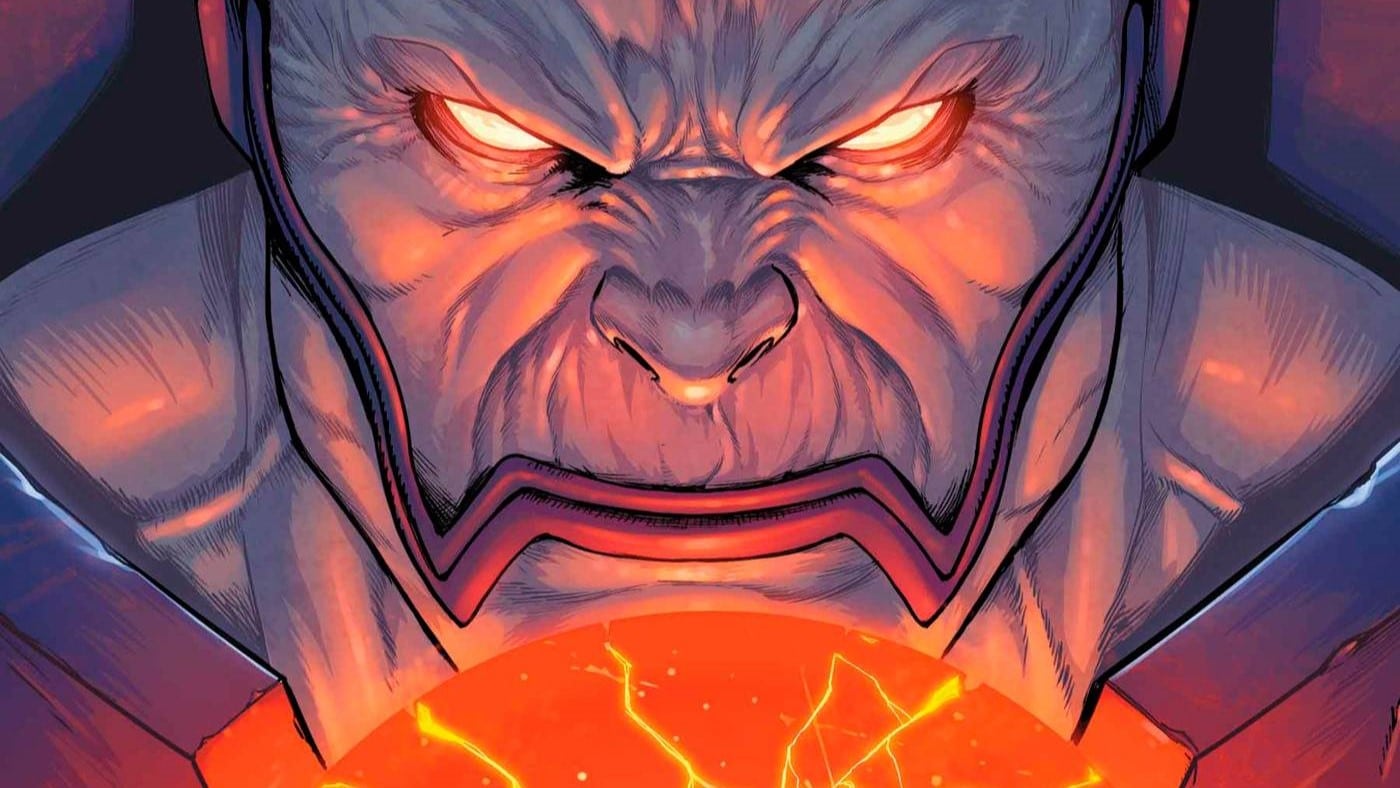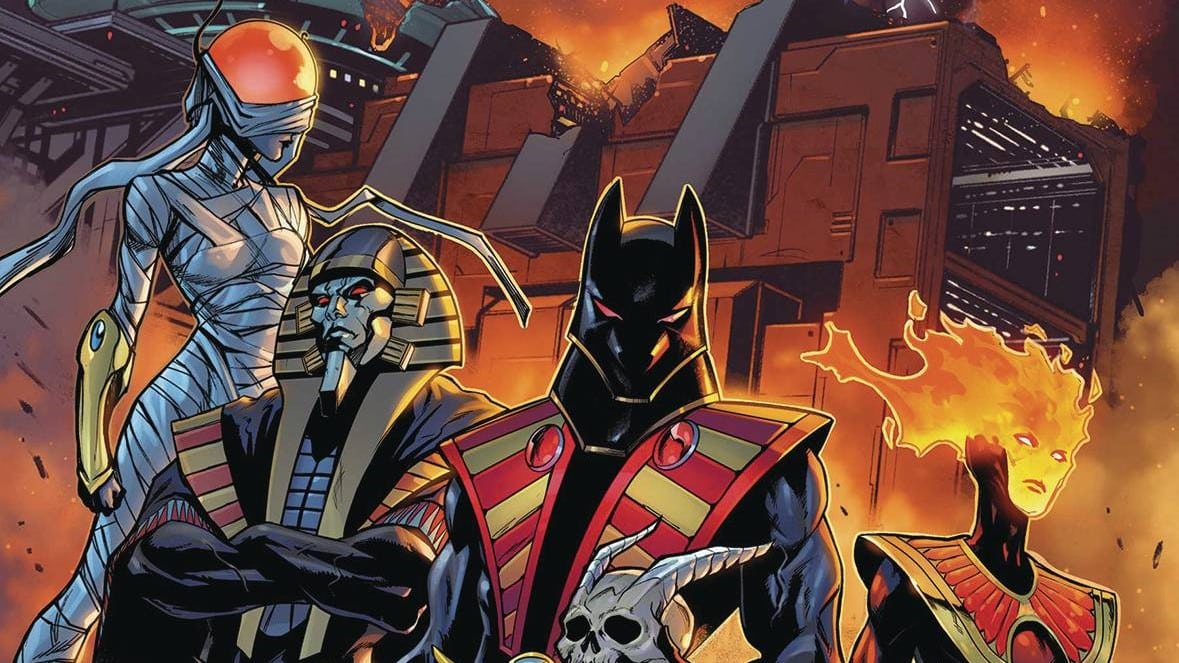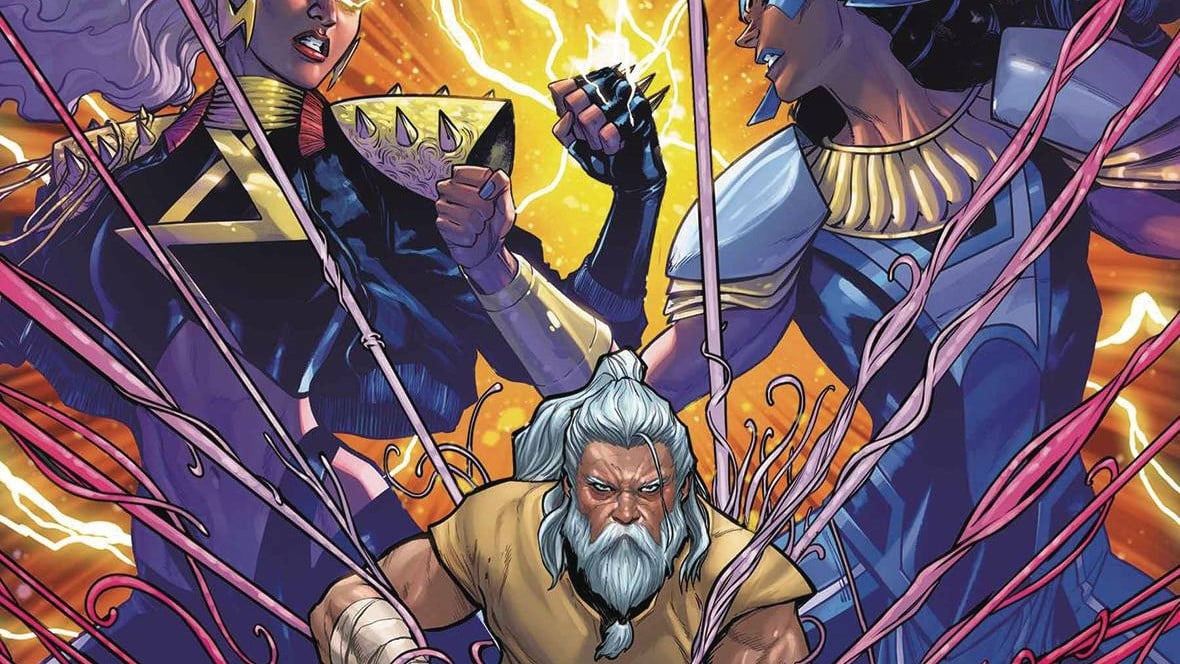Storm vs Vulcan. It all comes down to this. Al Ewing, Stefano Caselli, Jacopo Camagni, Federico Blee and Ariana Maher deliver X-Men Red #10.
Writing reviews of individual issues can sometimes feel like the writing equivalent of Groundhog Day: You’re praising (or parcing) the same things in every issue. Writers have their styles, their preferences for characters and characterizations, and the reviewer’s impression of those characterizations is unlikely to change from issue to issue.
So yes, of course, I loved X-Men Red #10. It’s a clear and fitting end to the story arc, as the title transitions to its Sins of Sinister branding, Storm and the Brotherhood.
Both the series and this issue are excellent, superb, and whatever other positive superlative you’d like to include. That’s what thesauruses are for, and Al Ewing’s series deserves every adjective we can scribble.
But the true brilliance of the book isn’t bound to an overarching narrative structure or grand plans and ideas. No, the brilliance of this book lies in its details: how it handles characters and contradictions in ways other writers would be tempted to rely on tropes for.
That’s why I found this issue so captivating: with all that happens in it, the soul of the work is distilled down to three moments. These are small moments compared to the explosive meat of the issue’s physical conflicts. But pepper is small. Salt is small. Garlic and onion powders are small. And maybe the Louisiana in me has me biased, but meat without flavor isn’t worth eating.
So let’s examine just why the seasoning makes this work so damn good.
Where the Wild Things Are

Manifold talks to the universe. That is his power. He asks the universe for help, and the universe listens, bending and folding itself to aid his call. This means that he can travel anywhere; that he can bring things anywhere; that everything, all things are within reach.
And yet, he is limited by what he can see. By what he has seen. By what he knows and believes. In the same way so many of our ambitions are limited by what we can perceive, his ability is limited by what he’s experienced. He cannot touch that which he’s not aware of; his imagination, however limited or vivid, cannot concoct support out of thin air.
Manifold was caught in an unyielding enthrall of the inter dimensional villains – the same captors who lit the fire of insanity inside Vulcan. His powers no longer under his control, they threatened to unleash his power to render the entire universe inert.
And while a Khora-boosted Cable taking back his viral load from the captors gave Manifold a reprieve, he still was exhausted and unsure
Until Lactuca arrived.
Opening Manifold’s eyes to the universe as they see it, Lactuca shared their gift: to know where everything is at all times. They knew to listen; they heard the cry.
See how Manifold’s eyes; lit with the yellow hue of his power, open in shock, juxtaposed with their weakened state a panel prior. Note how Lactuca regards him as a family, kin, a little brother. Those words – from and Arakki to a Krakoan – are significant. The bond broken by the Twilight Sword is forged anew, person by person, bit by bit.
Mutant gifts were meant to be given. Meant to be shared.
They just needed the foresight – the vision – to do so. And who better to provide that vision than the all-seeing?
Thus Manifold’s able to banish the manipulators to the void from whence they came, leaving our heroes victorious (or victorious enough) and ready to come home.
The theme of this work is the cultural revolution of the power of community. From the artists to the ruling council: where help is needed, help is given. None of us are alone.
We just need the vision.
You Don’t Know My Name

In the final issue of SWORD, Abigail Brand laments to Henry Gyrich (before killing him) that the mutants she “worked” for didn’t know who she was. They didn’t know or care about her home planet.
They didn’t even know her name.
So imagine her surprise when, upon fleeing from the team when her plan for domination fails yet again – a plan where she always assumed she was one step ahead when she was always one step behind – the Fisher King calls her name.
She’s in shock.
Not just because her super secret hideout isn’t that secret (and what is a secret location when Lactuca sees all?); not just because her plan has gone to hell… But because someone knew her name.
Throughout the two series, she’s only worked with people to push her own agenda – an agenda, I suspect, is more genteel than many would give her credit for. Her people are gone. Weakness, she believes, killed her people. She wants strength to help people.
And yet she does not trust others to share her concerns. She uses people, she exploits them, but she does not seek help. She is, even in the presence of others, maybe especially so, alone. (Just like her Arakki doppelgänger, Isca.)
So the shock of the Fisher King isn’t just his ability to find her; it’s his desire to come to her, knowing who she is, with a hand open for support. He comes to her, knowing her, implicitly telling her that she no longer had to be alone. Brand, beneath her belittling blister, yearns for community. Will she accept the community the Night Seats offer?
Again, none of us is alone.
New World Order

I always expected Storm to win. She’s faced stronger opponents and won. She knows herself and her powers well. And, uh, she’s on the cover of this issue and she’s headlining a miniseries. So of course she was going to win. That wasn’t the interesting point. How she would win was always the question, and I was not disappointed in the least.
Her power isn’t wind or lightning. It isn’t atmospheric pressure or ice storms. Her power is her people.
A certain subset of comic fans love measuring power levels in hypothetical battles. Can Hulk beat Superman; can Thor beat Hercules? But those battles are often limited to measuring who can punch someone’s face the hardest. And sure, some fighters might have stronger fists. But fists aren’t the only way to win fights.
Storm, using help from Wrongslide and Sobunar III (“Earth and Sea waited/ holding their breath”), took full advantage of the new Arakki tradition of mutual aid. She – they – made short work of Vulcan. His lack of ability to think beyond brute strength betrayed him and traps him; washed out by endless rain and bonded to a mysterum shell, he won’t be able to escape until he learns to move beyond just breaking things. Poetic justice is served; but really, what else would we expect from poets?
Storm has literally blown up a throne; given leadership of the council to the poet and willingly taken the seat of loss; lead in the donation of mutual aid groups; routinely asks permission before helping those in need; considers all mutants her equals.
The capitalist had her capital used against her. The rugged individualist was taken down by a group of people less powerful than he individually, but much more powerful as a group.
“From each according to his ability, to each according to his needs.”
One could read X-Men Red (Red!) as a communist manifesto, with Storm as its ideological Marx. (How does that work with the hyper capitalist Roberto? I’m on a roll, let’s ignore that for now.)
Storm is the People’s Champion. Hasta la victoria, siempre, indeed.
X-Men Red succeeds because it acknowledges expectations only to subvert them; and at the end of your experience, what you get far exceeds what you think you wanted.
This can be difficult, to put it mildly, for fans of comics. So many of them – of us – are stuck in an arrested development: we don’t want characters to change or mature, we don’t want characters to grow.
Yes, the characters are familiar, yes, and they are true to their archetypes. And yet they grow, they move, they’re molded in ways that simultaneously make sense and surprise. Ewing toes the line between comfort and conflict expertly; and we, the audience, are all the better for being along for the ride. Together.
For none of us is alone.
X-Treneous Thoughts
- I want to read Lodus Logos’ Collected works
- Stellanis…err, Sinister’s weakness – his stuttering, his lack of bloodlust, his repeated use of please – is notable. Whether it’s meant to convey his physical frailty and emotional misdirection in the face of a certain loss, or something deeper, we shall see in Sins of Sinister.
- Also, note in Immortal X-Men, how Sinister couldn’t kill Storm. Note how he had to create a distraction on Arakko to get her out of the council chambers. Is all of this – all of what we’ve read – part of an elaborate plan to get Storm off of Earth?
- Proudstar: “He’s got two months, I’ve got two fists. The math checks out” is a really effing amazing line. Put it in the hall of fame.
- The techno-organic exo-suit is badass in a very true-to-origins, 90’s Cable way. That’s a good thing.
- Notable that even people outside the universe know the Phalanx.
- The promise of “what comes next” is how Brand introduced Mysterium in SWORD #1; fulfilling to see that phrase used to close out her character arc.
- And of her arc: remember, she’s still in Orchis. I suspect Bobby’s plan for her (and to be clear, her escape and subsequent capture by the Fisher King is Bobby’s idea) has aways to go.
- “The frog and the scorpion” is a parable about the inability of beings to change their nature. The scorpion asks for a ride across a body of water from a frog. The frog, knowing what the scorpion does (sting to kill), is hesitant, but relents, assuming that the scorpion wouldn’t kill itself by killing the frog. Then the frog gets stung as the scorpion notes it is who it is. This, of course, applies to their use of Brand. While cable is (very) right to be wary, one should also note that Arrako, very much a “scorpion” society, has changed en masse for the better. Maybe a scorpion can’t change its nature. But who’s to say she, or they, or we, are scorpions?
A proud New Orleanian living in the District of Columbia, Jude Jones is a professional thinker, amateur photographer, burgeoning runner and lover of Black culture, love and life. Magneto and Cyclops (and Killmonger) were right. Learn more about Jude at SaintJudeJones.com.

